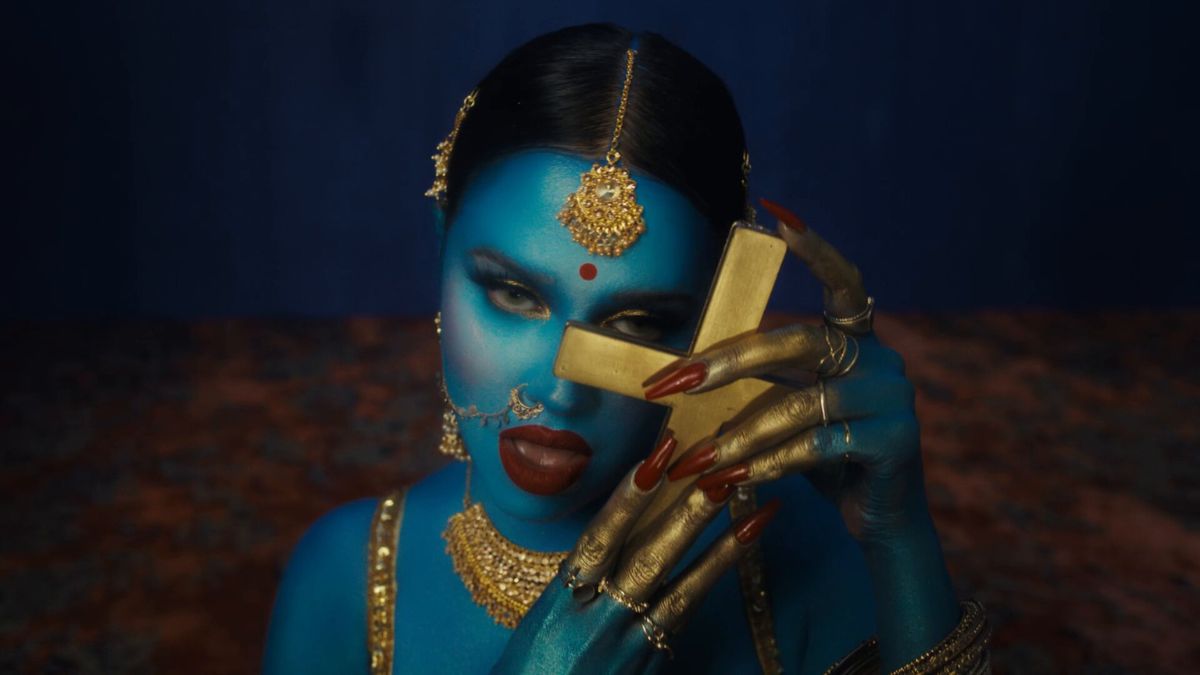Canadian rapper Tommy Genesis, born Genesis Yasmine Mohanraj, has ignited a cultural firestorm with her latest music video True Blue. The Indian-origin artist, known for her provocative style and underground rap persona, is facing intense backlash for dressing up as the Hindu goddess Kali—complete with blue body paint, gold jewelry, a red bindi, and a gold bikini.
The video, which also features Christian iconography used in a controversial manner, has sparked outrage across religious communities and social media platforms. Critics accuse the rapper of cultural appropriation, religious insensitivity, and using sacred symbols for shock value and viral attention.
Who Is Tommy Genesis?
Tommy Genesis is a Vancouver-born rapper of Tamil, Malayali, and Swedish descent. She rose to prominence in the underground music scene with her experimental sound and unapologetic lyrics. Often described as a “fetish rapper,” Genesis has built a reputation for pushing boundaries—both musically and visually.
Her latest track True Blue, part of her upcoming album Genesis, was released on June 22, 2025. Directed by Parris Goebel, the video features Genesis in a stylized depiction of Goddess Kali, a revered deity in Hinduism associated with destruction, transformation, and time.

The Controversial Imagery
In the video, Genesis appears with her body painted blue, adorned in traditional gold jewelry, and wearing a red bindi. She pairs this with a gold bikini and stilettos—an outfit that many have deemed disrespectful and offensive. The video also includes scenes of her licking a crucifix and holding it near her posterior, further fueling the controversy.
At one point, she folds her hands in a ‘namaste’ gesture, juxtaposed with explicit dance moves and provocative visuals. The combination of religious symbolism and sexualized imagery has not gone down well with viewers.
Social Media Backlash
The internet was quick to react. Hashtags like #BoycottTommyGenesis and #RespectHinduCulture began trending within hours of the video’s release. One user wrote, “This is not art. This is blasphemy. Our goddess is not your costume.” Another added, “You’ve managed to offend both Hindus and Christians in one video. That’s not edgy—it’s ignorant.”
Instagram and X (formerly Twitter) were flooded with comments demanding the video be taken down. Some users called for streaming platforms to remove the song, while others urged brands to cut ties with the artist.
Cultural Appropriation or Artistic Expression?
The debate has reignited long-standing tensions around cultural appropriation in the entertainment industry. Critics argue that Genesis, despite her Indian heritage, has crossed a line by sexualizing a sacred figure for aesthetic purposes.
“Wearing a bindi at Coachella is one thing. Dressing as Maa Kali in a gold bikini is another,” one user commented. “This isn’t representation—it’s exploitation.”
Supporters of Genesis, however, claim that art should be free from censorship and that her portrayal is a form of personal expression. “She’s reclaiming her roots in her own way,” a fan wrote. “You don’t have to like it, but you can’t silence it.”
Religious Sentiments and Legal Implications
In India, depictions of deities are deeply intertwined with religious sentiment. Legal experts have pointed out that such portrayals could potentially violate laws related to hurting religious sentiments under Sections 295 and 298 of the Indian Penal Code.
While Genesis is a Canadian citizen, the global nature of digital content means that her work is subject to scrutiny across borders. Activists have already filed online petitions demanding action from international human rights and cultural organizations.
Silence from the Artist
As of now, Tommy Genesis has not issued a public statement addressing the backlash. Her social media accounts remain active, and the video is still available on international platforms. The silence has only intensified criticism, with many accusing her of deliberately courting controversy for publicity.
A Pattern of Provocation?
This isn’t the first time Genesis has stirred controversy. Her music often explores themes of sexuality, rebellion, and identity. In past interviews, she has described herself as “the internet’s most rebellious underground rap queen.” But critics argue that rebellion should not come at the cost of disrespecting faiths and cultures.
The Broader Conversation
The True Blue controversy is part of a larger conversation about the responsibilities of artists in a globalized world. Where does one draw the line between freedom of expression and cultural insensitivity? Can heritage be used as a shield against accusations of appropriation?
These are complex questions with no easy answers. But what’s clear is that audiences today are more vocal, more connected, and more willing to hold public figures accountable.
Final Thoughts
Tommy Genesis’s portrayal of Goddess Kali in True Blue has sparked a necessary, if uncomfortable, dialogue about art, identity, and respect. Whether seen as a bold artistic statement or a blatant act of disrespect, the video has undeniably struck a nerve.
As the backlash continues to unfold, one thing is certain: in the age of digital media, no act goes unnoticed—and no controversy fades quietly.
Read more:
- Will Ananya Pandey play ‘Manjulika’ in ‘Bhool Bhulaiyaa 4’? Kartik Aaryan’s post gave a hint
- Dharmendra Hospitalised: Veteran actor Dharmendra’s health deteriorates, admitted to Breach Candy Hospital in Mumbai
- Sonakshi Sinha gets angry after seeing the leaked photo of pregnant Katrina Kaif, says – “You are no less than criminals…”
- Aishwarya Rai is richer than Abhishek Bachchan, how much is the actress’s net worth? Find out.
- Did Rakhi Sawant really sell both her kidneys for Salman? She said…’With the money she got, she bought valuable things…















